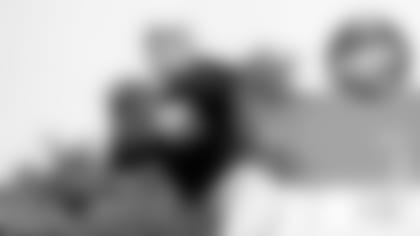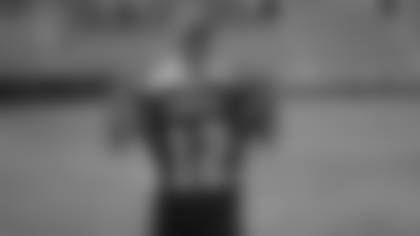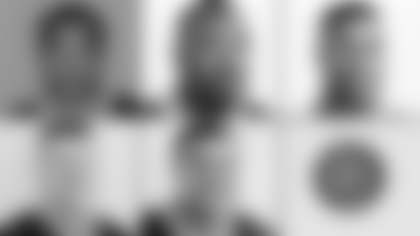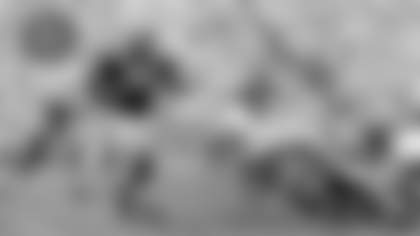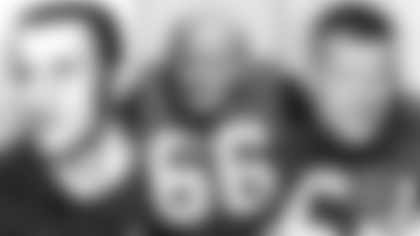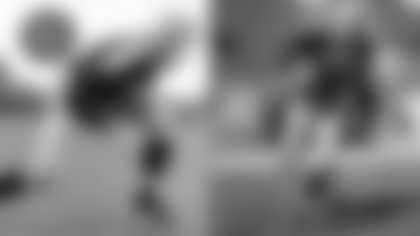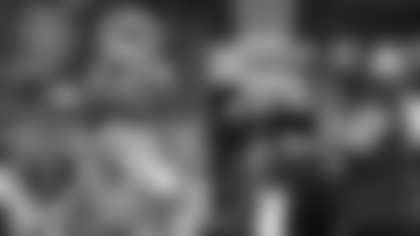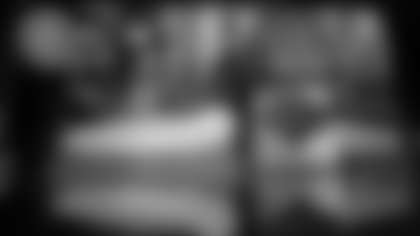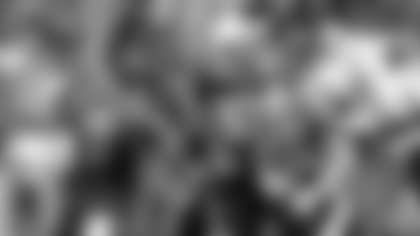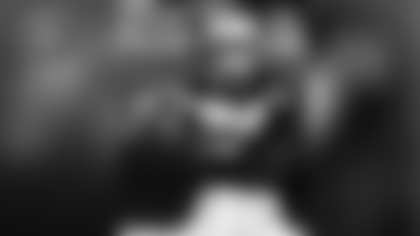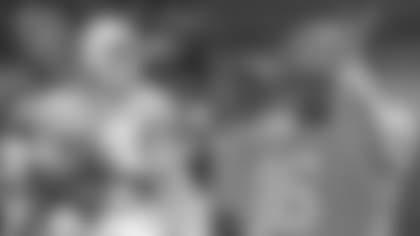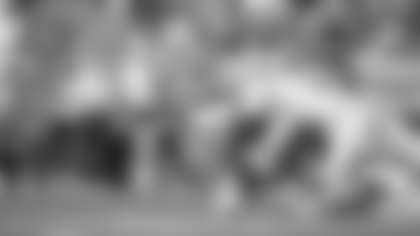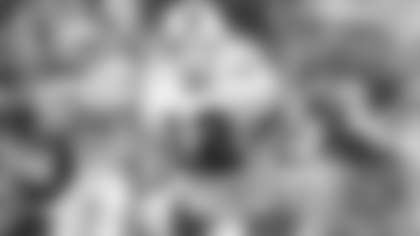Cliff Christl started gathering oral histories with former Packers and others associated with the team in 2000 and will continue to gather them as Packers historian. Excerpts from those interviews will be periodically posted atwww.packers.com
Ward Cuff finished his career with the Green Bay Packers in 1947 after playing nine years with the New York Giants and one with the Chicago Cardinals. It was one of the most tumultuous seasons of the Curly Lambeau era and Cuff was in the middle of what might have been its biggest controversy. On Nov. 16, Cuff missed a 23-yard field goal attempt with 31 seconds remaining and the Packers lost to the Cardinals, 21-20, in a game played at old Comiskey Park. A product of Marquette University where he was one of the stars of its 1937 Cotton Bowl team, Cuff was a back and a kicker. He played with the Giants from 1937 to 1945, winning an NFL championship in 1938 and losing in three other title games. Two of the losses came against the Packers in 1939 and 1944. Cuff also was the Giants' career scoring leader when he left. Before the 1946 season, he requested a trade because he had kids in grade school and no longer wanted to move his family from his home in Milwaukee to New York just for the football season. In April 1947, the Packers purchased Cuff from the Cardinals. At the end of the season, Cuff retired as a player and became football coach at Green Bay Central Catholic High School. He held the post for four seasons and compiled a 23-4-2 record before becoming an assistant coach at Oregon State. In 1976, former owner Wellington Mara picked Cuff as one of four defensive backs on his all-time Giants team.
On what the consequences were for missing his last-second field goal try against the Cardinals: "(Lambeau) kept my check…I was making about $7,000 (for the season). Hell, he tried to fine me a whole game's salary."
On whether he ever got his money back: "He kept my check, but he paid me. I got him in his office and threatened him with bodily harm. He finally gave me some money. I went up to his office and said, 'OK Curly, pay up or else you go out the window.' He said, 'Well, I don't have a check.' I said, 'You call the (officers) and tell them to make out a check.' I had to wait until after the season to get paid for that Cardinal game. Curly didn't give it to me. The organization paid me."
On his overall impressions of Lambeau: "He was a (s.o.b.) in every way you can think of. He was kind of crude and a schemer and a womanizer. He was a real cheat. I don't know how the hell he kept his job as long as he did."
On whether other players felt the same as he did about Lambeau: "A lot of the players didn't like Curly and there was pretty good reason for it. He was taking their money, trying to date their wives. I'll tell you he was bad."
On whether Lambeau really hustled his players' wives: "He was miserable. He tried to date everybody's wife. He was just a miserable guy. That's all. Guys who had nice looking wives, he'd tried to date them. I'll tell you, he was just a heel, really."
On Lambeau's fines: "He'd fine ballplayers who were laid up and crippled and couldn't play. If the team had a bad day, he'd fine the whole (darn) bunch, even the guys who couldn't play. He fined the whole team after losing to the Cardinals (in 1948) and fined (some players) as much as $300 or $400."
On where the money went: "He'd get their checks and wouldn't pay them. I don't know if he kept it himself, gave it back to the franchise or what the hell he did with it."
On whether Lambeau was animated and a screamer: "He was during a ballgame. Like in the Cardinal game, the first thing he said to me was, 'You missed that field goal on purpose,' because I played for the Cardinals the year before. He yelled right in my face. I said, 'You better shut your mouth or you won't get off the field.'"
On Lambeau's rules about drinking: "The players didn't go to bars much. They better not. If Curly found out you were in a bar, he'd give you a fine. After (the Packers) started losing, he thought everybody was drinking. (Heck), I never took a drink the whole time I played professional football."
On Lambeau's other rules covering off-the-field behavior: "Anything (Lambeau) could find at all to get on his high-horse about, he'd do it. They used to play some little card game for about 10 cents a point or something like that. He'd say, 'They're more interested in the (gosh darn) card game than they are about playing.'"
On what he knew about Lambeau before joining the Packers: "I was warned before I went to Green Bay that Curly was tough to play for. Even a guy like Don Hutson had problems with Curly, although not severe problems."
(Note: Cuff and Hutson were in the same USO unit that toured Europe during World War II.)
On how he wound up at Marquette as a native of Redwood Falls, Minn.: "I went there with the intention of playing hockey, but they dropped hockey after I was in school."
On losing to the Packers, 27-0, in the 1939 NFL Championship Game played in Milwaukee: "(Giants coach) Steve Owen wasn't with us that week. His mother died and he went home. The team was kind of down in the dumps. It was windy and stormy. It was a terrible day to play football. I remember I had a bad week before that. I split my hip-pointer open. I had about seven stitches in that thing. They kicked off to us and I caught that (darn) kickoff and went up through there and Baby Ray hit me just as we opened the wedge. He hit me right on the hip and took out every one of those stitches. We went back into the huddle and while they were calling the play, I was throwing up. But I kept playing."
On the Packers' finishing 6-5-1 in 1947 after starting out 4-1, including a season-opening victory over the Chicago Bears: "I think a lot of the guys just lost heart."
On whether there were many characters on the team: "You know the situation was so bad up there, we didn't have much fun. It was a losing proposition. We started out good, but it got so miserable playing that the team just went downhill."
On whether Lambeau, then in his 27th NFL season as Packers captain or coach, had stayed current with the game: "He was terrible. He lost it by the time I played for him. He had that old Notre Dame Box that he played. Hell, you could defense the (darn) offense he had and almost have three guys on the field without an assignment. He pulled both guards, either way, sometimes both guards and a tackle. (Heck), there was no way they could keep those guys from busting through the line at that time. So Curly was having a problem. And every time, hell, he didn't blame him, he blamed the players."
On whether Lambeau still used the Notre Dame Box, or at least elements of it in 1947, after announcing that he planned to switch to a V-formation or a form of the T: "That's the only kind of football Curly knew. It was far outdated. All the guys had played T-formation in college, then they went up there and played that old Notre Dame Box. They had to learn the signals, the positions all over again. And it was easy to defense."
(Note: In 1918, Lambeau learned the Notre Dame Box from Knute Rockne during his one season with the Fighting Irish, but both coaches modified the offense over the years. Lambeau made perhaps his biggest change in 1932 when Red Dunn retired and Arnie Herber became his featured passer. With Dunn, Lambeau's quarterback was the primary passer. Once Herber assumed that role, Lambeau's quarterback became strictly a blocking back. Herber played mostly right halfback. In 1947, Lambeau switched to what he called a V-formation and his quarterback once again did most of the passing. Lambeau claimed the V was a variation of the T, but also admitted it was similar to the offense he used with Dunn.)
On sharing placekicking duties with Ted Fritsch that season: "I'll tell you the thing that I couldn't understand in Green Bay was that the kickers never practiced kicking during the week. I never practiced kicking field goals when I was in Green Bay. In New York, we had practiced it every day."
On Lambeau's reasoning for splitting the kicking duties: "I don't know. There was no rhyme or reason to it. It was (whoever) Curly sent in to kick it. You didn't ask him any questions because he was unreasonable to deal with."
(Note: Cuff attempted 16 field goals and made seven to tie two other players for most in the league. Fritsch made six of 13 attempts, including a league-high 50-yarder. Cuff was 30 of 30 on extra points; Fritsch, 2 of 2.)
On Fritsch, who also started at fullback: "He was a good football player. He was a hard runner."
On future Pro Football Hall of Fame back Tony Canadeo: "Canadeo was a good football player. He was kind of a loner, but a good football player."
On Jack Jacobs, who started five games at quarterback: "To tell you the truth, I don't know how to exactly describe Jacobs. He didn't mix too much with the players. He was kind of quiet and kept to himself. At times, he could be tougher than hell. He wasn't a good passer. I'll tell you where he could play; he was a good defensive player. I saw Jack Jacobs just really rack Em Tunnell of the Giants. (Jacobs) was playing halfback and Tunnell went around the end, and Jacobs just hit him right in the open and just creamed him. He was a big hitter."
(Note: In January 1947, Lambeau acquired Jacobs, who had backed up Sammy Baugh in Washington, with the idea that he'd replace Larry Craig, a blocking back, as quarterback and run his new offense.)
On Irv Comp, who intercepted six passes and also started one at quarterback: "Irv Comp was a fair quarterback. He wasn't the best quarterback in the world. He wasn't the best passer in the world. But he gave it a whirl. He tried."
On halfback Bruce Smith, former Heisman Trophy winner at the University of Minnesota: "Bruce Smith was the kind of guy that Curly picked on. Bruce Smith, I thought, had a lot of ability. But anything he'd do, Curly would get on him about it. He could never do anything good."
On tackle Paul Lipscomb, who had a reputation for being one of the Packers' dirtiest players: "Oh (gosh), you never knew what Paul Lipscomb was going to do. If you got knocked down by a bunch of ballplayers, he'd be in there pounding away. If you were on the same team, you might even get hit. He was just wild. We called him the crazy Southerner."
On Tiny Croft, another tackle who stood 6-4, weighed 280 and had played collegiately at Ripon College: "Big Tiny. He wasn't a fat guy, though. Croft was a real bone-pile. He was all elbows and knees if you tried to block him. He was pretty good."
On Ed Neal, one of the game's first 300-pounders and a blacksmith by trade: "Big Ed was funny. Ed had a lot of ability, but he didn't have the head for it. Just an easygoing guy who wanted to be out there and have a good time with the guys. If Neal had been smart and made up his mind he wanted to do something, he would have been pretty tough. He had a lot of ability."
On Rockwood Lodge, the Packers' training quarters from 1946 to 1949: "That was another thing that was bad for the ball club. The lodge was built on practically solid rock. It was built on a cliff and I don't think the dirt was more than six inches over that granite rock. You'd run on that (darn) thing and it was like running on concrete. Everybody had bad legs. Shin splints, stuff like that. They realized it was a bad place for a practice field."
On living at Rockwood Lodge: "I stayed there when my wife wasn't in town, but then we rented a small place along the bay during the season. The Packers probably preferred it that way because it saved them money."
On whether he had any fond memories of playing for the Packers: "Anybody who plays for Curly – outside of that, it was great being in Green Bay. The guys on the team were really great."
Cuff died in 2002 at age 89. The excerpts above were taken from two interviews conducted in 2001: One in April and the other in October.



